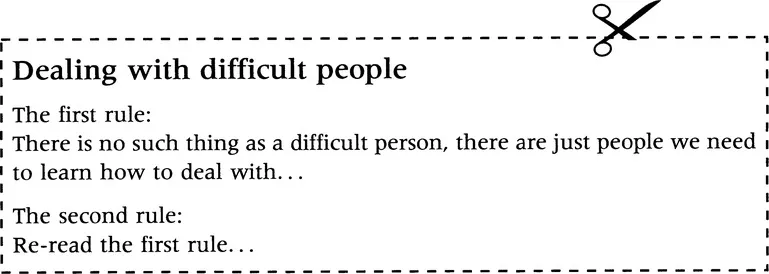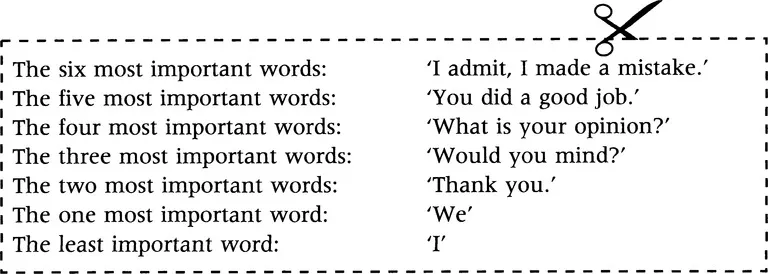![]()
As we look ahead into the next century, leaders will be those who empower others.
Bill Gates
D
DIFFICULT
difficult adj. 1 needing much effort or skill 2 troublesome, perplexing
Difficult what? Difficult decisions? Difficult report? Difficult budgets? No, let’s do difficult people!
People, difficult people, that’s the one we seem to have the most trouble with.
Here are a few tips.
Make a start by cutting this out, sticking it on the fridge door with one of those magnet things and reminding yourself every day.
And whilst you are about it, cut this out, too.
If our car won’t start it’s no good blaming the car. No good kicking the tyres, shouting at it and slamming the doors. Maybe it needs petrol, a service, a new battery. Who knows what it could be? We just find out what the problem is and fix it.
The same logic applies to people. If we have difficulties with our families, colleagues we work with, or our friends, what’s the point of blaming them? Figure out the reason and then fix it.
DIFFICULT? MOI?
Yes you! Before you can think about dealing with difficult people, let’s start with you. Are you difficult? Are you the one out of step? Are you the one with the problem?
Here’s some bad news for you: nice people are not always like you! Yes, yes, I know the world would be a much simpler place if everyone was like you, but they’re not. They will have different backgrounds, different education, different perspectives, different cultures and different ambitions. They will be motivated differently and think differently. And they can still be nice people!
So the number one rule in dealing with difficult people is:
Don’t take it personally!
Really difficult people are most likely to be selfish and inwardly focused. They won’t give a toss about you. For them – it’s all about them. So, don’t let them get under your skin!
OK, so what do you do? Easy. Ask yourself this question:
What do I want to get out of this encounter?
Decide, in advance:
Then, ask yourself:
Do I need to change MY behaviour to get the most out of it?
This doesn’t mean you have to let a rude pig trample all over you. But it does mean you don’t need to get into a bare knuckle fight.
The brutal truth is, they don’t care about you...
This may come as something of a shock, but there aren’t too many people out there that care too much about you. There’s your Mum, she probably still loves you, family, partners and a few friends, maybe. But, when push comes to shove, you’re on your own.
How we treat each other is largely a product of how we feel about each other. Most folk start off neutral, we don’t feel anything about each other. You might be lucky and find a pre-prejudiced soul who is downright antagonistic, but the fact is most people couldn’t care less about you.
What do they care about? Answer: they care about themselves. They, are into them, in a big way. That’s why they’re difficult.
What can you do about it? The brutal truth? Not much! It is very unlikely that you will change them. Anyway, why bother? There is a much easier way.
Remember this:
Difficult people are predictable people.
That simple fact makes your life much easier. How many times have you heard folk say: ‘Oh, don’t bother with him, he’s a misery’ or ‘Don’t ask her, she finds fault in everything.’
You see, difficult people are not just difficult with you. They are into themselves and are, usually, difficult with everyone. Predictable is easy. You can prepare for difficult, you can plan for difficult, you can plot, scheme and collude against difficult. They are stuck in their ways. All you have to do is to be smart enough to manoeuvre.
This doesn’t mean becoming a soft touch, or a pushover. It means you use your brains more than your emotions. The trick is to decide in advance what you want out of an encounter, plan accordingly and go for it.
If you know someone is a nit-picker and a stickler for detail – give them detail. ‘In the report I’ve included all the background I can think of, including spreadsheets for four scenarios. Let me know if there’s something else you need.’
If someone is abrupt, get straight to the point, avoid flannel and go to the heart of the matter. ‘I know you are very busy so I’ll come straight to the point. What do you think about this next phase of the development?’
If someone is an egomaniac – tell ‘em how good they are. ‘Jane, I know you are the neighbourhood expert on this, so I’ve put the detail together and made a couple of recommendations. But, can I leave it to you to come up with some alternative directions, if you think they might be better?’
The strategy is easy. You won’t change a difficult person by being difficult. By deciding what you want out of the encounter and being prepared to manoeuvre, trim, sidestep, change, call it what you like, you end up winning. You end up getting what you want!
It’s so easy that you will end up wishing everyone was difficult – because the difficult ones are easiest to manage!
Don’t think difficult people are predictable? Let me tell you, difficult people are so predictable that behavioural psychologists and other management guru experts reckon there are just seven classic types.
A number of psychologists have come up with definitions and metaphors for the seven types. I think the best work comes from a big brain-box of someone called Robert Bramson. He did the work in 1988.
Bramson starts by identifying aggressive people and uses a neat metaphor to describe them. Really, they almost explain themselves. Bramson tells us aggressive people divide into three sub-types:
the Sherman Tank
the Sniper
the Exploder.
Here’s Bramson’s advice about the Sherman Tank:
The term Sherman Tank accurately depicts what a hostile person does. They come out charging. They are abusive, abrupt, intimidating, and overwhelming. They attack individual behaviours and personal characteristics. They bombard you with unrelenting criticisms and arguments. Sherman Tanks usually achieve their short-run objectives, but at the cost of lost friendships and long-term erosions of relationships.
Sherman Tanks have a strong need to prove to themselves and others that their view of the world is right. They have a strong sense of how others should act, and they are not afraid to tell them about it.
Sherman Tanks value aggressiveness and confidence. This belief causes them to devalue individuals they perceive as not having those qualities.
The basic core belief of a Sherman Tank is, ‘if I can make you out to be weak, faltering, or equivocal, then I will seem, to myself and others, strong and sure.’
The Sniper?
Snipers prefer a more covert approach. They put up a front of friendliness behind which they attack with pot shots, use innuendoes, non-playful teasing and not so subtle digs. Snipers use social constraints to create a protected place from which to strike out at objects of anger or envy.
They pair their verbal missiles with non-verbal signals of playfulness and friendship. This creates a situation where any retaliation back at the Sniper can be seen as an aggressive act, like you are doing the attacking not the defending.
Much like the Sherman Tank, Snipers believe that making others look bad makes them look good. They also have a strong sense of what others should be doing, but their constant cutting remarks usually de-motivate colleagues rather than produce results.
And the Exploder? Exploders are characterised by fits of rage fuelling attacks that seem barely under control. Bramson says:
These tantrums can erupt out of conversations and discussions that seem to start friendly. Usually these tantrums occur when the Exploder feels physically or psychologically threatened. In most cases an Exploder’s response to a threatening rema...





